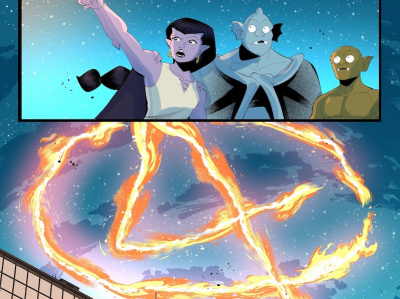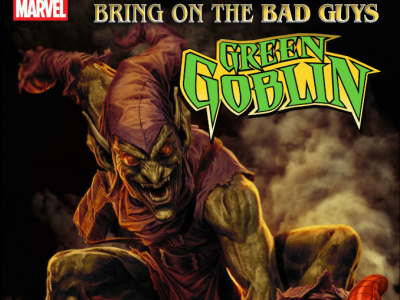
A couple of weeks ago at the San Diego Comic-Con, we sat down with DC President and Publisher Paul Levitz (DC Vice President Sales Bob Wayne sat in) for our annual talk about the state of the comic business and DC's place in it. In Part 1, we talk about the setting for the meeting (the San Diego Comic-Con), the state of the comics market in 2005, and DC's place in the fastest-growing parts of that market. In Part 2, we discuss the ongoing restructuring of DC's sales and marketing staff, what those changes mean for DC's relationships with its primary sales channels, and ask whether graphic novels will ever pass periodicals. And in Part 3, we talk about the toy business, DC's Crisis editorial event, and ask whether the current spate of comics-based movies is a bubble.
What's your perspective on the growth of this show [the
Levitz: The weirdest experience I've had lately was at the licensing industry show, which had its ceremonial dinner in the ballroom where we used to hold the
Aside from the personal reaction of an old fan of wonderment, the thing that's most interesting is watching the convergence. It's not just the scale of the thing, but the integration. When the movie companies first started showing up, they would hawk stuff that didn't have anything to do with comics. They just thought that kids who liked comics might be interested. Then the toy companies begrudgingly showed up and said, 'You'll like this. It's for your age group.' What we do culturally seems to be permeating everything and connecting everything in the room: either the Star Wars stuff that moves backwards into the comic form that Dark Horse has done so well the last few years, or the manga material, or comics themselves. It's so indicative of what's going on in the whole popular culture.
What's your overview of the state of the market? Maybe you could break up your response into what's happening with periodicals, and graphic novels.
Levitz: We're having a wonderful year in every segment. More creative work is fueling the periodical side of the business. More creative courage is being exhibited than we've had in the field the past few years. Even many of our competitors who have not had the same proportion of success have been taking more chances, trying more creative experiments. Different formats, different publishing programs, different promotional stunts than we've had the last couple of years. That's very healthy. Our periodical sales are up more for the first half of this year versus prior years than I can remember. I don't think we've gained tremendous share. We've picked up some share, not enormous, certainly not the double digits that our sales are up. That's a sign of general health.
The graphic novel side of the business continues to gallop. We're up over 20% so far this year in backlists, which is the most reliable barometer of general growth and health. It's not a function of how many titles you're publishing, but of people coming in and finding things that have already existed, probably a larger percentage of that in bookstore distribution. They've had a phenomenal first half with us. Some of that's the Batman movie, but still. Everything's firing on all guns. The only format that's behind where it was a couple years ago is prestige, which is somewhat fading out for us. We've committed less product to that niche in the last couple of years. It's been quite a few years since it was a significant part of the business.
Is that because it's neither fish nor fowl?
Levitz: Maybe. It may also be that the kind of story that one told in that format is now being looked at as an original graphic novel. People don't want to do a significant story in a prestige book. They think they'll sell more and have a bigger impact by doing it during one of the ongoing monthly titles. Folks that might have migrated into that format ten years ago are now more interested in working in the regular monthly format.
Do a story arc.
Levitz: Yeah. Frank Miller and Jim Lee doing All Star Batman and Robin, I could easily have seen that as a prestige format mini-series five years ago.
Some artists and writers went through a phrase where they didn't want to just do a story arc because it wasn't important enough. They weren't convinced they would get marketing support for it or they weren't convinced that people would pay attention. Now it's become normal to say, 'Hey, this is the cool guest talent coming in for this arc.' We've all adopted that as commonspeak. They've grown more comfortable with it and that's affected their willingness to work in that fashion.
Especially in bookstore channels, the fastest growing demographic is teen girls. What's DC's approach to that market?
Levitz: I'm not a hundred per cent sure it's still the fastest growing. It certainly has been the past two or three years.
Growth is certainly slower. I suspect it's still growing but not nearly as fast.
Levitz: You may have looked harder at those numbers. Manga will be the door in for them because it's the material they're most familiar to them, whether it's genuine manga import licensed titles coming from
Do you see an opportunity for the use of DC characters?
Levitz: It will probably be a mix of DC and original characters. But if you're looking at a sweet spot of sixteen year old girls as being the demographic, I don't think that Superman or Batman is likely to be the most exciting thing simply because it's been around a while and it's not been identified as being their possession. There may be an opportunity to take a Wonder Woman or a Supergirl that has a freshness in its treatment. The coolest stuff we can do there will be original. When I talk to the Japanese manga editors, and they talk about the process of creation, they talk about different story-telling themes as being important. You talk to an American English professor and they'll talk about conflict as what drives story. The Japanese editors talk about friendship driving the story, not being driven by conflict at all. That's had a resounding influence on our sixteen year old girls. We'll need to create some new kinds of characters to capture them.
The Japanese launch new properties in anthologies, then they progress to collections, to anime, and to figures. DC had one of the most courageous efforts at an anthology title in (relatively) recent memory with Action Comics Weekly. It didn't work. Are you learning anything from the Japanese model that would allow anthologies to be more successful?
Levitz: We've learned a bunch of things from the Japanese that would make us approach the anthology experience differently, perhaps more successfully. The challenge remains that in Japan, it's an all-newsstand business. We don't have the ability to reach sixteen year old girls with the kind of numbers we would need through the current distribution.
What about using a book format?
Levitz: It's a harder thing to pull off. Some of the marketing things they do, when you talk with Japanese Shonen Jump editors about how they user reader surveys and involvement, and how closely they affiliate the reader, I think that logic is transferable here.
That's what I was getting at, the feedback loop that allows them to tailor the content on an ongoing basis. It seems like a very successful model.
Four or five years ago, DC was the undisputed leader in graphic novels. I haven't done any analysis on market share now, but with the growth of manga, and Dark Horse having a great year, where do you think DC falls now among graphic novel publishers, all channels combined?
The best numbers I could do last year, we were third, in a tie with Marvel at that point. They had the benefit of Spider-Man 2, which was very effective for them in the graphic novel business. Dark Horse clearly, with Star Wars this year, will have some advantage. Sin City helps but doesn't reach as widely. It's a great thing, but when you talk about the graphic novel business the greatest bump you can get is people who aren't in love with our form, aren't even comfortable with our form, but are just interested in something else moving through it. I'm sure Sin City drove phenomenal numbers for them and hopefully it's converted some people. Sin City was particularly important as a film for showing the world comics aren't one flavor. I'm not sure it will have an effect on market share. Constantine had some sustained effect on the Hellblazer graphic novels. I suspect they'll see the same sort of thing on Sin City.







